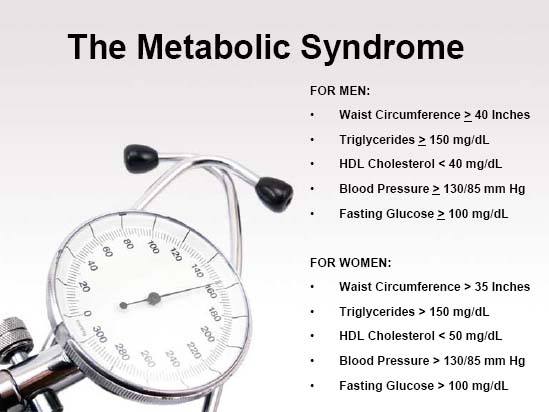Related terms: clustered risk factors, obesity, diabetes, hypertension, triglycerides, glucose intolerance
Certain
variables play important roles in a
person's chances of developing heart disease. These variables are called risk
factors. Some of these heart disease risk factors cluster together in certain people. This clustering of risk factors is known as metabolic syndrome. Metabolic syndrome is also called Reaven syndrome, insulin resistance syndrome, or Metabolic Syndrome X.

People with metabolic syndrome have a clustering of the following risk factors:
People with metabolic syndrome have an increased risk of heart attack and coronary artery disease.
What causes metabolic syndrome?
Researchers think that metabolic syndrome is a genetic condition, passed down through the genes of family members.
People with insulin-resistant conditions such as diabetes and hyperinsulinemia are more likely to have metabolic syndrome. Diabetes is a condition where the body cannot make or respond properly to the hormone insulin. Hyperinsulinemia is a condition where large amounts of insulin are pumped into the bloodstream.
Too much insulin in your bloodstream increases your risk of heart attack because it
- Raises your triglyceride levels.
- Lowers your levels of high-density lipoprotein (HDL or "good cholesterol").
- Raises your levels of low-density lipoprotein (LDL or "bad cholesterol").
- Makes it harder for your body to clear fats from your blood after you eat.
- Raises your blood pressure.
- Increases your risk of blood clots.
As many as 10% to 30% of people in the United States have some form of insulin resistance.
What are the signs of metabolic syndrome and how is it diagnosed?
Patients with metabolic syndrome seldom have symptoms. But certain signs might lead doctors to diagnose metabolic syndrome.
Doctors can check your HDL cholesterol, triglycerides, blood pressure, and weight, all of which are warning signs of metabolic syndrome. You may also need blood tests to measure the levels of glucose and insulin in your bloodstream.
How is metabolic syndrome treated?
Since metabolic syndrome is a
cluster of conditions, treatment starts with the underlying conditions. So, if you have
diabetes, hyperinsulinemia, high cholesterol levels, or high blood pressure,
you should be under the care of a doctor to get those conditions under control.
Exercise and weight loss are key to improving insulin sensitivity and lowering blood pressure and cholesterol
levels.
In some cases, medicines can help treat metabolic syndrome, but your doctor will want you to make lifestyle changes, including eating a proper diet, avoiding sweets, quitting smoking, and drinking less alcohol.



